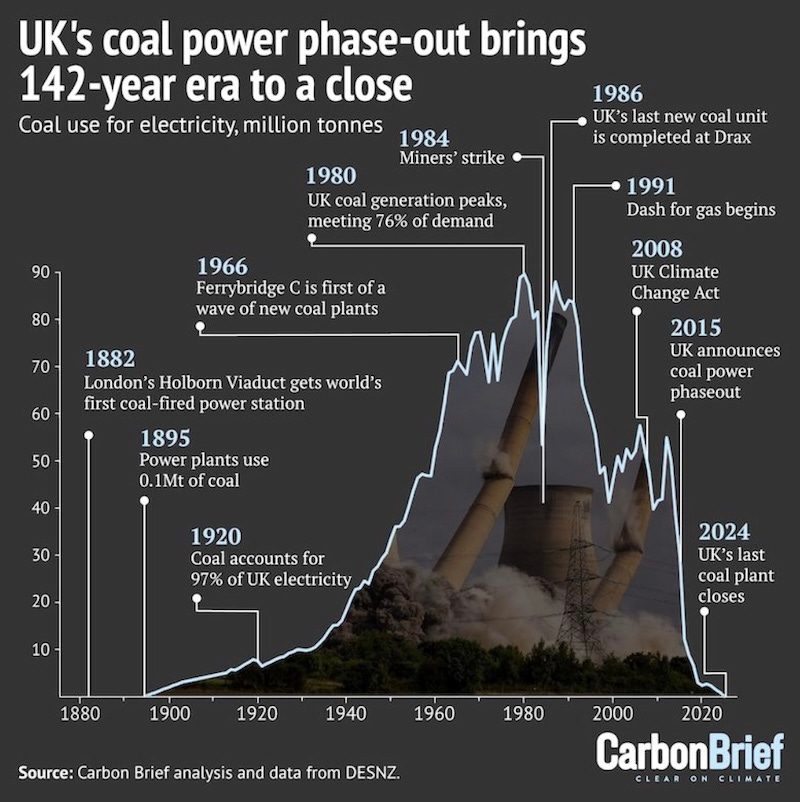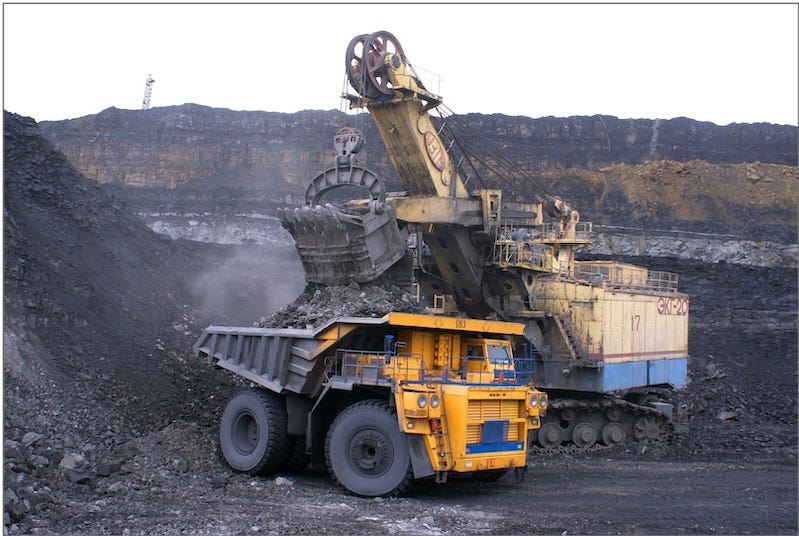B.C.'s Least-Known Coal Company Buyout is Bad News for Canada
The deal for a huge coal company takeover is done. And it’s not good for anyone except Glencore and Teck shareholders.
Joan Baxter is an award-winning investigative journalist and author at the Halifax Examiner in Nova Scotia and a freelance reporter for The Energy Mix. Today’s Weekender is based on her report earlier this year for Mining Watch Canada, produced under contract with Energy Mix Productions.
With bad news breaking out all over, it’s not really surprising that the story this past summer about Swiss industrial giant Glencore swallowing Canada’s Teck Resources’ coal business in Canada would generate only a few headlines, and thus go unnoticed by the vast majority of Canadians.
But it’s a shame it flew under the radar, because it is a very big and very bad deal for Canada.
On July 4 this year, Canada’s Minister of Innovation, Science and Economic Development, François-Philippe Champagne, approved the takeover of Teck’s Elk Valley Resources in British Columbia by the multinational behemoth, Glencore.
A report I wrote at the time for MiningWatch Canada noted that most Canadians had not even heard of Glencore or the takeover, despite the fact that Glencore has an atrocious corporate record, and the deal could cost them billions of dollars for the cleanup of British Columbia coal mines.
A Shameful Reputation
There is some irony about Canadians worrying about the growing presence of a giant foreign company extracting its resources. The majority of the world’s mining companies are Canadian, and they’ve earned a shameful reputation in other countries for suing poor nations, abusing human rights, and causing social and environmental havoc.
But that doesn’t mean we should ignore it when a notorious corporation like Glencore comes to town and buys up four big, polluting Canadian coal mines.
No matter how much praise it heaps on itself, Glencore is almost in a notorious class of its own when it comes to corporate irresponsibility, climate dishonesty, corruption, and sometimes even criminality, as I learned while writing the report.
Its scandal-filled past, contempt for the law, and reputation for bullying governments speak for themselves, and Canadians really should know more about a company that now has a growing foothold in their country.
The company’s list of wrongdoings and misdeeds is so long it would take more than a short report, even a book, to document them. But here are a few.
Above the Law
Let’s start with choice words United States Attorney General Damian Williams in New York had for Glencore in 2022, when it pled guilty to foreign bribery and corruption and paid more than US$1.1 billion, the biggest fine ever given in a US foreign bribery and market manipulation settlement.
“The scope of this criminal bribery scheme is staggering,” said Williams. “Glencore paid bribes to secure oil contracts. Glencore paid bribes to avoid government audits. Glencore bribed judges to make lawsuits disappear. At bottom, Glencore paid bribes to make money—hundreds of millions of dollars. And it did so with the approval, and even encouragement, of its top executives. The criminal charges filed against Glencore in the Southern District of New York are another step in making clear that no one—not even multinational corporations—is above the law.”
The problem is that for decades, Glencore has behaved as if it were indeed above the law.
The company has a long and sordid history of flouting laws. Its co-founder, Marc Rich, was on the FBI’s “most wanted” list for two decades, hiding out in Switzerland to avoid justice in the United States, where he was wanted on 65 criminal counts, including “the biggest tax evasion case in United States history.”
He also made “astronomical profits” breaking an international embargo and supplying apartheid South Africa with oil, and dealing with pariah states and corrupt dictators around the world, including with Iran when U.S. hostages were being held in that country.
Even though the company severed ties with Rich in 1994, and he died in 2013, financial experts say the approach that Rich pioneered lives on at Glencore.
Covertly Pushing Coal
For all its talk of supporting the Paris climate agreement, in 2022 Glencore’s profits soared to a record US$34.1 billion, largely due to coal, the world’s dirtiest and most dangerous fossil fuel. In Australia, Glencore funded a covert campaign to push coal.
Today, as if oblivious to the climate emergency, Glencore is the world’s largest private-sector coal company. In 2023 its carbon emissions represented 1.1% of the world’s total greenhouse gas emissions, on par with many global oil giants.
Glencore owns the infamous Cerrejón mine in Colombia, which continues to supply the world with “coal that is stained in blood.” In 2020, United Nations special rapporteur on human rights and the environment, Canadian David Boyd, called for a halt to operations at Cerrejón, which he said had “seriously damaged the environment and health” of the Wayuú, the country’s largest Indigenous community.
In Rouyn-Noranda, Quebec, where Glencore owns an industrial facility, citizens have filed a class action lawsuit against Glencore and the Quebec government “for damages caused to residents of toxic and carcinogenic contaminants.”
And now Glencore owns four polluting coal mines in British Columbia that will cost several billions of dollars to clean up one day.
Given its corporate record, the question is: why would anyone trust Glencore at all?
Unfortunately, it looks as if the federal government did when it approved the takeover of Teck’s coal mines—a takeover that is likely to cost the climate, the environment, and Canadians dearly.
Chart of the Week

$2B Alberta Gas Pipeline Pitches Decarbonization Amid Technology Challenges
Germany Won’t Need Canadian Gas as Renewables Surge, Green Hydrogen Beckons
‘Massive Victory’ for Nuclear as Three Mile Island Plant Set to Reopen
Cities Must Prepare for ‘Absolute Certainty’ of Power Outage + Heat Wave: Experts
Ontario’s Latest Plan to Acquire Electricity Supply Could Sideline Renewables, Experts Say
Puerto Rican Climate Migrants Find Refuge in Buffalo
Manitoba Plans 600-MW Wind Procurement with Majority Indigenous Ownership
Renewables Could Cut EU Power Prices in Half by 2030, Report Predicts
Affordable Housing Squeezed as Climate Hits Insurance Market
Large wildfires can create decade-long heat island in the wild (Canadian Broadcasting Corporation)
Shell scraps plans for hydrogen project on Norway’s west coast due to lack of demand (Reuters)
What’s on Harris’ Day One climate agenda? (Politico)
RFK Jr.’s ‘Sad’ Slide From Environmental Hero to Outcast (Inside Climate News)
Under a Texas sun, agrivoltaics offer farmers a new way to make money (Washington Post)
PJM Blocks Battery Storage Connections that Could Unlock 10s of Thousands of Megawatts: ACORE (Utility Dive)
Lockdown lifted for residents near Port of Montreal after lithium battery fire (Canadian Broadcasting Corporation)
U.S.-Funded Coalition to Help States Eliminate Carbon Emissions from New Homes (American Council for an Energy-Efficient Economy/ACEEE)
England and Wales’ heat-leaking homes unleashing same amount of CO2 as Denmark emits every year (The Mirror)
Brookfield Asset Management raises $2.4-billion for climate fund backed by UAE (Reuters)
Woman gets 18 years for neo-Nazi plot to shoot up Maryland power stations (Washington Post)
Labour appoints Rachel Kyte to climate envoy role axed by Sunak (The Guardian)








Excellent report, complete with Glencore's atrocious history of bribery and corruption. Utter shame on the Feds for allowing this to happen.